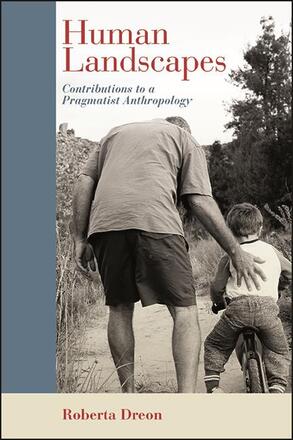Book review iv "Human Landscapes: Contributions to a pragmatist anthropology"
 |
| Human landscapes |
I am rueing the day (whichever it was) I lost my hard copy. Despite best intentions, I'm taking it slowly with the pdf, also much appreciated c/o the author Prof. Roberta Dreon.
The cover resonates at present as it was my mother's funeral on Wednesday. This provoked memories of my father too - happy times. Whatever emotional intelligence I can lay claim to I realise it is a gift from mum: a pragmatist anthropology indeed, as grief flies around.
I can't help 'read' this as I apply a pragmatic tool:
"By following or even radicalizing Mead, it could be argued that it is at least partly through the use of verbal communication that the sense of one’s own self has been made possible—where self-reflection is considered to be a primarily affectively based form of awareness. While avoiding any hypostatization of interiority as a primary condition—which would give rise to the well known philosophical problems of the internal/external, private/public dichotomies—we should consider why humans are often capable of having a rich interior experience." p.68.
Dreon's (necessary) focus upon sensibility, habits and the insights obtained are rewarding:
In Chapter 3 Pragmatist Contributions to a Theory of Emotions -
"In spite of the abundance of theories, I think that developing a pragmatist approach can still be fruitful, because it helps to get rid of many of the noxious dichotomies that have shaped the philosophical as well as psychological conception of emotions—mind-body dualisms, nature-culture gaps, and private-public oppositions.." p.71.The book isn't dizzying but the traversals from the sciences to the affective sciences, as an understanding of the emotions is sought highlights the elephant that follows us on the journey across Cartesian and other divides. Salience is here - in qualitative form, epigenetic threads are highlighted (p.73). As noted key to the project is dealing with a pragmatist theory of emotion. The legacy of issue in health and other disciplines is evident here, even if not explicitly stated. Conjoining experience, the environment and emotion is to grapple with parity of esteem - even if apolitically.
Clearly not a nursing or psychotherapy text - there are many connections: emotional intelligence, introspection (and its limits?).
"Emotions often arise out of a break in habitual behavior and provide the organism with a kind of affective proto-evaluation of environmental conditions that can later become an object of reflection and judgment." p.74.
I've reading to follow on enactivism, embodiment ever since at least:
Paley J. Clinical cognition and embodiment. Int J Nurs Stud. 2004 Jan;41(1):1-13. doi: 10.1016/s0020-7489(03)00081-6. PMID: 14670389.
Plus some books (yes two in :: two out mum...).
When aged 16-17 I read and wrote about Wundt's recognition of the limits of introspection:
".. from the perspective of the methodological hypothesis that introspective analysis should be avoided because it is scientifically unreliable." p.76.(If I find that notebook I'll do another post. Reading about the history of psychology, I was drawn to mental health/illness.)
Anyone familiar with h2cm and posts here will appreciate the trigger of association produced by:
"... 'interactive' is different from 'intentional'..." AND ".. a mechanical process; on the contrary, by emphasizing its plasticity." p.76.
We can even link book reviews!
"... recent ideas that the brain is at least partially configured after birth ..." p.77
(Brainscapes)
Clearly in the slow lane with this - but enjoying the learning and a further post - when I'll point to the review as a series.
Dreon R. (2022) Human landscapes. Contributions to a pragmatist anthropology. Suny Press, Albany.



 orcid.org/0000-0002-0192-8965
orcid.org/0000-0002-0192-8965

